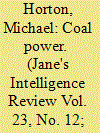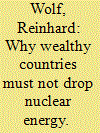|
|
|
Sort Order |
|
|
|
Items / Page
|
|
|
|
|
|
|
| Srl | Item |
| 1 |
ID:
109248


|
|
|
| 2 |
ID:
150058


|
|
|
|
|
| Summary/Abstract |
Electricity consumption growth in China has experienced radical adjustment from high speed to medium speed with the advent of new economy normal. However, the investment enthusiasm on coal power remains unabated and leads to continuous operation efficiency deterioration in recent years. In this paper, we quantify the rational capacity and potential investment of coal power in China during the 13th FYP period (2016–2020). By employing power planning model and fully considering the power sector's contribution in the 15% non-fossil primary energy supply target by 2020, we estimate that the reasonable capacity addition space of coal power ranges between 50 GW and 100 GW, depending on the expected range of demand growth. We find that if all the coal power projects submitted for Environmental Impact Assessment (EIA) approval were put into operation in 2020, capacity excess would reach 200 GW. Such huge overcapacity will bring forth disastrous consequences, including enormous investment waste, poor economic performance of generators and more importantly, delay of low-carbon energy transition. Finally, policy recommendations are proposed to address this issue.
|
|
|
|
|
|
|
|
|
|
|
|
|
|
|
|
| 3 |
ID:
175927


|
|
|
|
|
| Summary/Abstract |
A key obstacle to nuclear energy as a decarbonization policy is the public perception of risks of radiation leaks from reactors. In particular, the “not-in-my-backyard (NIMBY)" syndrome suggests that individuals oppose nuclear reactors in their neighborhoods because they overestimate their risks. Arguably, such perceptions would be acute for those who have lived in the vicinity of a nuclear accident. We conducted a surveyembedded experiment in Japan (N = 2574) to assess how the NIMBY syndrome influences public support for restarting nuclear reactors when health, economic, and climate change benefits of nuclear energy are highlighted. We focus on Japan because the risks of nuclear energy became salient after the 2011 Fukushima accident. We test for two types of NIMBY effect, (1) respondents' proximity to any nuclear power plant and (2) respondents' place of residence in 2011 and its proximity to Fukushima. We do not find support for either the NIMBY syndrome or the Fukushima effect. On the contrary, we find support for a “reverse-NIMBY” among low-income residents, when they are treated with information on nuclear energy's low local air pollution (health). Our findings suggest that support for nuclear energy varies across population groups and depends on how its local benefits and costs are framed.
|
|
|
|
|
|
|
|
|
|
|
|
|
|
|
|
| 4 |
ID:
190643


|
|
|
|
|
| Summary/Abstract |
At the United Nations Framework Convention on Climate Change 26th Conference of the Parties (COP 26) in November 2021, Vietnam pledged to phase out unabated coal power by the 2040s or as soon as possible thereafter. Achieving this will require major efforts. This study investigates the drivers for Vietnam's coal power phase-out decision, barriers to Vietnam achieving a successful unabated thermal coal phase out, and potential strategies to achieve the pledge. To this end, a survey of 43 experts from government agencies, research institutions, civil society, and industry was carried out, supplemented by 23 follow-up interviews. The results indicate that ambition to attract international support for green growth initiatives in a context of limited financing options for new coal power projects appears to have been the primary driver for the decision. Key barriers include concerns about electricity shortages and incomplete regulatory frameworks for new clean power options. Recommended strategies include: 1) reforming regulations to facilitate investments in clean energy, electricity transmission, and energy storage; 2) continuing political prioritisation; and 3) building broad-based support from the community and enterprises. Vietnam's case is relevant to other developing countries and beyond.
|
|
|
|
|
|
|
|
|
|
|
|
|
|
|
|
| 5 |
ID:
138347


|
|
|
|
|
| Summary/Abstract |
Current estimates indicate that several hundred thousand deaths per year can be attributed to climate change. Developed countries have reacted to this growing disaster by increasing the use of renewable energies, but what is to be done with the additional electricity thus generated? Should it be used for cutting back coal-fired energy production or can it be used for substituting nuclear energy? Priority must be given to replacing coal power, since developed countries have a strong duty to minimize the physical harm caused by their electricity generation. Dropping nuclear energy prior to coal power cannot be justified because the risks of nuclear energy pale in comparison to the suffering that emissions from coal-fired plants inflict both on their host countries and on poorer countries in the global South that (a) do not benefit from this energy and (b) have far less capacity to cope with the effects of climate change or other environmental damages. This article argues that when faced with a choice between operating coal-fired power plants or nuclear reactors, governments are obliged to opt for nuclear energy.
|
|
|
|
|
|
|
|
|
|
|
|
|
|
|
|
|
|
|
|
|